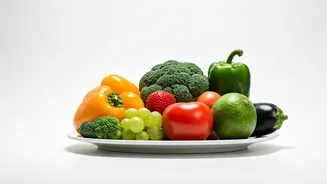Understanding Uric Acid
Uric acid is a natural byproduct formed when your body breaks down purines, substances present in certain foods. High levels of uric acid can lead to a condition
called hyperuricemia, which may cause gout and other health complications. Dietary choices significantly affect uric acid levels. Consuming foods high in purines, such as red meat and seafood, can elevate these levels. Therefore, adopting a diet rich in foods that help reduce uric acid is a proactive approach to maintaining health.
Cherries' Sweet Defense
Cherries, especially tart cherries, are well-known for their potential to lower uric acid. They contain compounds like anthocyanins, known for their anti-inflammatory and antioxidant properties. Research indicates that regularly consuming cherries can decrease uric acid levels and decrease the risk of gout attacks. You can enjoy cherries fresh, frozen, or as juice, incorporating them easily into your meals and snacks. Cherries offer a delightful and effective way to manage uric acid.
Coffee: A Stimulating Ally
Surprisingly, coffee has been associated with lower uric acid levels. Studies have indicated a link between regular coffee consumption and decreased risk of gout. The exact mechanism isn't fully understood, but it might involve coffee's ability to affect the body's metabolism and excretion of uric acid. Moderate coffee intake can be considered a beneficial addition to your diet. Keep in mind that individual responses can vary. Moderation and listening to your body are key.
Vitamin C's Role
Vitamin C, a powerful antioxidant, can play a role in lowering uric acid. Studies have indicated that vitamin C supplementation can help decrease uric acid levels in the blood. Vitamin C enhances kidney function, which assists in the removal of uric acid. Foods like oranges, grapefruits, bell peppers, and strawberries are excellent sources of vitamin C. Consider including these nutrient-rich foods in your diet to support healthy uric acid levels and overall wellness.
Low-Purine Foods
A diet low in purines is crucial for managing uric acid levels. Selecting foods with lower purine content can prevent spikes in uric acid. Focus on incorporating fruits, vegetables, and whole grains into your meals. Generally, these foods have lower purine levels, which are less likely to increase uric acid production. Steer clear of excessive consumption of red meat, organ meats, and certain seafood, as these are high in purines. This dietary approach supports the body's natural processes.
Hydration's Importance
Drinking adequate water is essential for lowering uric acid. Water assists the kidneys in flushing out uric acid from the body. Staying well-hydrated dilutes the uric acid concentration in the bloodstream, lowering the risk of crystal formation that leads to gout. Aim for a sufficient water intake daily and avoid sugary drinks, which might raise uric acid levels. This simple step can significantly impact your health.
Dairy's Benefits
Studies have shown that consuming low-fat dairy products can help in lowering uric acid levels. Dairy products contain proteins that promote uric acid excretion. These foods can be included in a balanced diet. Consider options such as milk, yogurt, and cheese that have lower fat content for optimal benefits. Include these in your meals to support healthy uric acid management and overall health.



















